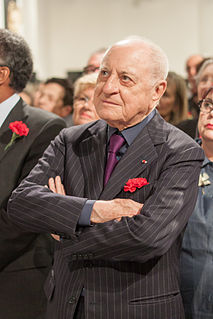A Quote by Jeanette
What art does is to coax us away from the mechanical and towards the miraculous.
Quote Topics
Related Quotes
if we continue with what is surely our greatest Western temptation, and think that in some way history owes us a solution, that we can, by pursuing our own most parochial self-interest, achieve in some miraculous way a consummation of world order, then we are heading not simply towards great disappointments, but towards disaster and tragedy as well.
In addition to giving comfort and joy, art also has the miraculous ability to let us live in other men's skins, to test our perceptions and beliefs against theirs, and perhaps to be changed as a result. It does this by portraying the world creatively, heightening our perception and enriching our understanding of things as they are.
Science can give us only the tools in the box, these mechanical miracles that it has already given us. But of what use to us are miraculous tools until we have mastered the humane, cultural use of them? We do not want to live in a world where the machine has mastered the man; we want to live in a world where man has mastered the machine.
The subject of contemporary art should include a political dimension, the distrust contemporary art has towards the existing order. One manifestation of this distrust is the mechanical dichotomization between art's form and its political content; the other is the institutionalizing tendency of anti-institutionalization. We almost never resist ourselves - the part of ourselves that has been institutionalized. We have occupied the word "resistance" and have become its owner, while "resistance" has become our servant. Thus, we own "resistance" and occupy it as a position of power.
works of art feel towards human beings exactly as we do towards ghosts. The transparency of spectres, the diffuseness in space which lets them drift through doors and walls, and their smell of death, disgust us not more than we disgust works of art by our meaninglessness, our diffuseness in time which lets us drift through three score years and ten without a quarter as much significance as a picture establishes instantaneously.


































